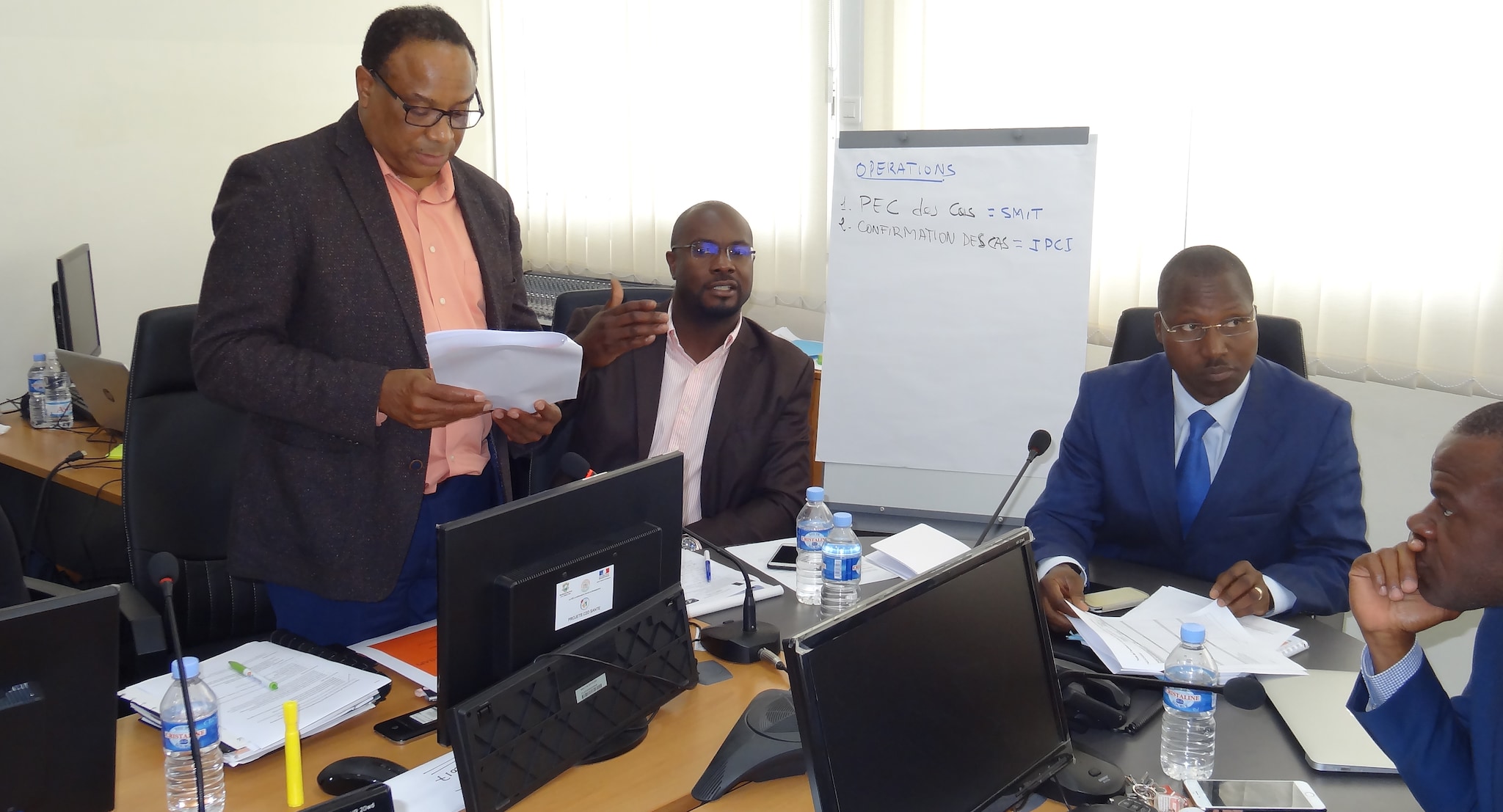Protecting People Through Public Health Law
December 9, 2019

PHEOC simulation exercise at the Côte d’Ivoire NPHI led by CDC’s Chuck Menchion and Mamadou Diarrassouba. Photo: Jocelyn Nebre
Around the world, laws that support resilient public health systems and strengthen global health security protect countless lives every day. From the cleanliness of the water we drink, to seatbelt laws that keep us safe, to diseases that many people no longer think about because of vaccines, public health laws impact nearly every part of our lives.
Public Health Law Provides a Roadmap
Public health laws act like any other law, authorizing activities, clearing operational authorities, and building systems to ensure accountability. These laws guide governments and ministries of health in developing processes that build program structure and establish functional roadmaps. In turn, these roadmaps guide public health officials on tackling a variety of health challenges.
CDC Experts: More than Just Scientists
CDC plays a prominent role in bridging public health law and sustainability. With decades of experience leading health programs and developing strong partnerships around the world, CDC experts provide guidance on how public health law can be used to build stronger, more sustainable health programs.
CDC’s public health law experts improve health by advancing the understanding and use of law as a tool. As part of a multi-year project, CDC mapped health security-related laws in effect across 25 countries. CDC uses this data to help governments and ministries identify areas of opportunity for continued progress.
For many countries, this process of developing structured and formalized public health systems can take years; however, CDC recognizes the importance of this investment. “Legal and policy change is not something that happens overnight, even if laws are enacted in one day,” said Emily Rosenfeld, a policy analyst in CDC’s Center for Global Health.
Public health laws can help to create sustainable health structures, leading to lasting systemic changes. CDC’s support helps strengthen global health security and public health capabilities around the world, improving and protecting the health of people worldwide.
Public health laws give countries the power to PREVENT, DETECT, and RESPOND to health crises.
CDC experts helped Liberian officials compile and analyze existing public health laws, making it easier to identify potential gaps in the legal structure. Using this information, Liberia fully revised public health laws, adding sections to strengthen emergency operations, biosafety and biosecurity, reporting, and disease tracking abilities. In 2017, using the revised laws, Liberia fast-tracked the establishment of the National Public Health Institute of Liberia.
Pakistan is currently revising and strengthening its public health law framework through revision of their National Public Health Act. CDC continues to provide technical and legal assistance to senior government officials, addressing areas for opportunity in the current Public Health Act. With CDC support, Pakistan identified best public health law practices and developed a health strategy to fit the country’s specific needs.
CDC aided Côte d’Ivoire and Togo in building processes for legal authorities that set clear protocols for emergency operations and defined staff roles in national public health emergency operations centers (PHEOC). Both Côte d’Ivoire and Togo have now passed laws making their PHEOCs fully operational.
CDC partnered with the Cambodian Ministry of Health to train health officials on using laws as tools to improve the handling and storage of toxins and pathogens. Government officials are working on a ministerial decree that will strengthen laboratory biosafety and biosecurity; once approved, it will be Cambodia’s first ministerial decree on lab biosafety and biosecurity.
- The Joint External Evaluation (JEE) Process: Assessing health security in Côte d’Ivoire, July 2019
- Keeping Safe Around Highly Dangerous Pathogens and Toxins, Spring 2019
- Disease Detectives Working Toward Polio Eradication, Spring 2019
- Faster, Smarter Outbreak Response in Liberia, Summer 2017
- Togo’s Institut National d’Hygiène Puts the Staged Development Tool to Use, November 2016